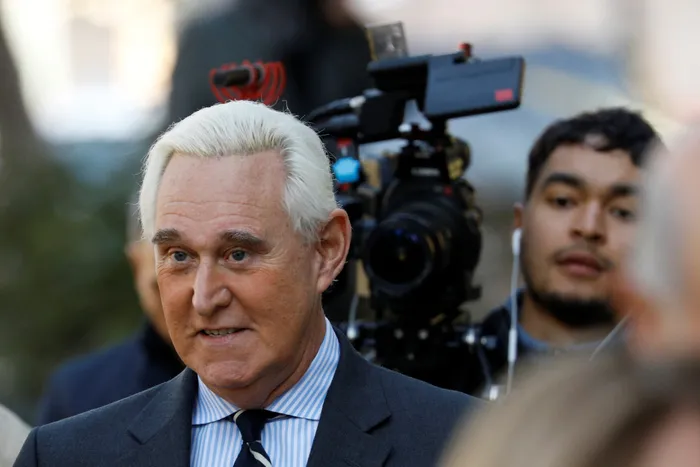'Straight up lied': prosecutors blast ex-Trump adviser Roger Stone in trial

Former Trump campaign adviser Stone arrives for his criminal trial at U.S. District Court in Washington. Photo: Tom Brenner/Reuters. Former Trump campaign adviser Stone arrives for his criminal trial at U.S. District Court in Washington. Photo: Tom Brenner/Reuters.
WASHINGTON - The prosecution in the trial
of Roger Stone on Wednesday painted President Donald Trump's
longtime adviser as a liar in a criminal case stemming from
former Special Counsel Robert Mueller's probe that detailed
Russian meddling in the 2016 U.S. election.
After a 12-member jury was selected, opening statements
began in the trial in federal court in Washington. The
67-year-old veteran Republican political operative - a
self-described "dirty trickster" and "agent provocateur" - has
pleaded not guilty to charges of obstructing justice, witness
tampering and lying to the U.S. House of Representatives
Intelligence Committee.
"Stone straight up lied" to Congress, prosecutor Aaron
Zelinsky told the jury.
Stone has been a friend and ally of Trump for some 40 years.
"Now you'll ask, why didn't Roger Stone just tell the
truth?" Zelinsky asked the jurors. "The evidence in this case
will show that Roger Stone lied to the House Intelligence
Committee because the truth looked bad."
"The truth looked bad for the Trump campaign, and the truth
looked bad for Donald Trump," Zelinsky added.
The prosecution said the jury will hear testimony from Steve
Bannon, who served as an adviser to Trump during the campaign
and in the White House, and former deputy campaign chairman Rick
Gates, who testified for the government last year in a trial
that led to the conviction of former campaign chairman Paul
Manafort.
Zelinsky accused Stone of five categories of lies. Zelinsky
also told the jurors the case was neither about politics nor
about who hacked the Democratic National Committee in 2016. U.S.
intelligence agencies and Mueller concluded the hacking was done
by Russia.
Stone is accused of lying to the Intelligence Committee
about the Trump campaign's efforts to obtain emails hacked by
Russia that were published by the Wikileaks website to harm
Democratic candidate Hillary Clinton's candidacy. The
Democratic-led panel is now spearheading the House impeachment
inquiry against Trump over his request that Ukraine investigate
a Democratic rival, Joe Biden.
DEFENSE OPENING STATEMENT UPCOMING
The defense will get its chance to deliver its opening
statement in the afternoon. The opening statements followed the
selection of a 12-person jury in the trial, with U.S. District
Court Judge Amy Berman Jackson presiding.
"Stone regularly updated people on the Trump campaign at the
senior levels about whatever information he thought he had about
Wikileaks," Zelinsky said, adding that Stone "was going to the
very top of the Trump campaign - the CEO of the Trump campaign -
a man named Steve Bannon."
Part of the case involves communications between Stone and
two other key figures: conservative radio host Randy Credico and
conservative author Jerome Corsi. The prosecution said Stone
relied on both men as intermediaries with Wikileaks founder
Julian Assange and the Wikileaks organization as part of an
effort to learn more about a plan to disclose damaging emails
about Clinton.
Zelinsky said Stone tried to pin all of his interactions
with a Wikileaks intermediary on Credico and lied about his
communications with Corsi. Zelinsky said that if one is looking
for someone to "pin something on, Randy Credico is a pretty good
person to pick."
"Randy Credico will tell you that in his past, he has
struggled with alcohol, and Randy Credico will tell you that he
is excitable and Randy Credico will tell you that Roger Stone
knew all of this," the prosecutor said.
Zelinsky said that in July 2016, Stone spoke by phone with
then-candidate Trump for about 10 minutes. Although the precise
contents of the call are unknown, Stone sent an email to Corsi
about an hour later and told him "that a friend of theirs living
in London should see Julian Assange," Zelinsky said.
Two days later, Corsi emailed back and said their friend
planned two more disclosures of hacked emails, Zelinsky said.
Zelinsky said Stone lied in sworn testimony to
Representative Adam Schiff, now chairman of the House
Intelligence Committee, about emails to third parties related to
Assange.
"He said he had no emails of any kind referring to Julian
Assange," Zelinsky said.
In truth, Stone had "many, many such emails" including the
message from Corsi saying more damaging email dumps were coming,
Zelinsky added.
The charges against Stone stem from Mueller's investigation,
although the case is now being prosecuted by the U.S. Attorney's
Office for the District of Columbia. Mueller wrapped up his
22-month investigation in March.
Mueller documented Russian efforts to boost Trump's
candidacy and led to criminal charges against several Trump
advisers and campaign aides. Stone and his former business
partner Manafort were the only two from this group not to plead
guilty. Manafort was convicted by a Virginia jury and is
incarcerated after being sentenced to 7-1/2 years in prison.